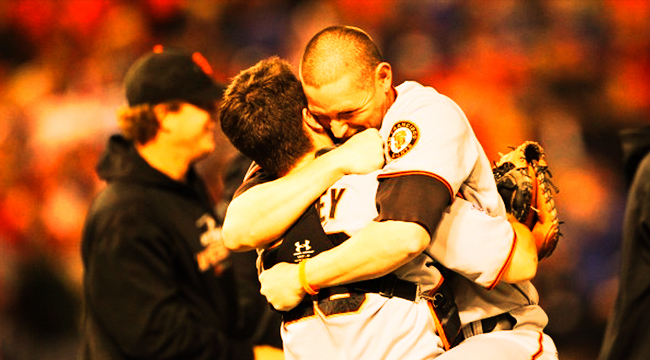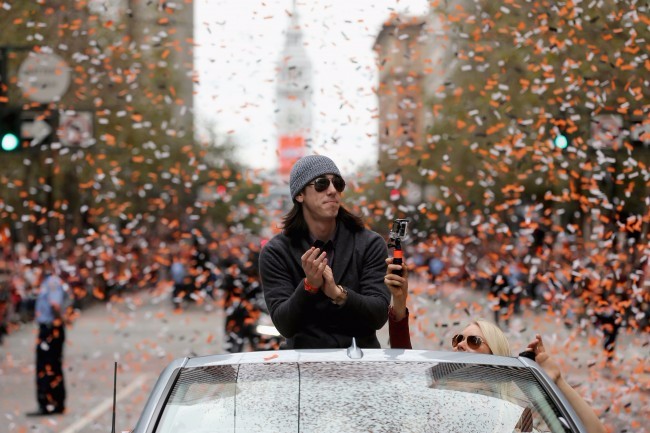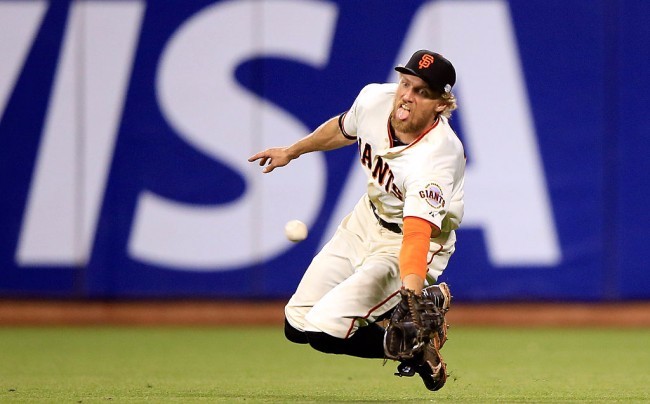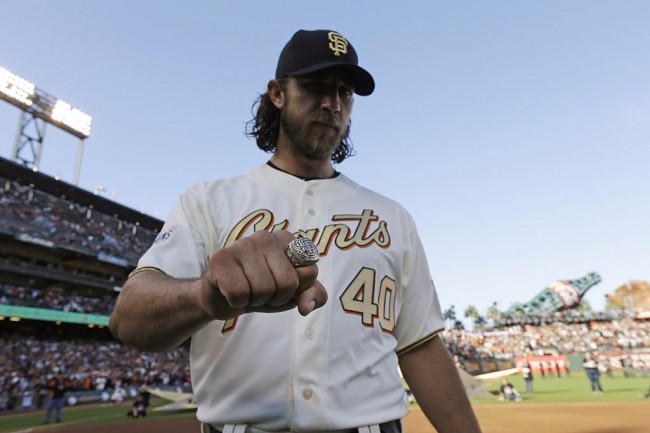
The San Francisco Giants’ run of three World Series victories in five years ranks as an unprecedented run of success for the franchise. The Giants had not won a title in San Francisco before 2010, when they upset the Texas Rangers in five games to end a 52-season drought full of disappointments, collapses, and cruel twists of fate. The 2010, 2012, and 2014 titles would make legends of Buster Posey and Madison Bumgarner, turn “Even-Year Bullshit” into a mantra for fans and an insult to everyone else, and convince the front office they were on par with the best-run teams in American professional sports.
Most organizations would feel impossibly fortunate to experience such a run, so why do perhaps only the Giants themselves view the team as a dynasty? If it qualifies as such, now would be the time to assess its legacy. After losing 99 games in 2017, we can safely evaluate this recent Giants era without wondering if it somehow remains incomplete.
So, what did it mean? Will they come to define this decade of baseball? And will anyone outside the Bay Area remember them with the kind of fondness usually bestowed on three-time champions?
(A brief disclaimer: I’m a San Francisco native who considers the night of November 1, 2010, to be one of the greatest in the history of the city. I walked to AT&T Park after the final out in Arlington and have never experienced such pure joy. As a kid, the Giants were less my favorite team than an extension of my personality. If that’s no longer the case, it’s only because the first championship allowed me to leave behind whatever traumas associated with seasons such as 1993 [103 wins without a playoff berth] and 2002 [a late World Series Game 6 collapse followed by a predictably listless Game 7, which I had the misfortune of attending in person].)
The greatest difficulty in assessing the thrice-champion Giants comes largely from the fact that each title-winner forged its own character. For non-fans, the 2010 team was undoubtedly the most likable of the trio. Built around young aces Tim Lincecum and Matt Cain and attention-seeking closer Brian Wilson, the Giants stood out as bizarre and vaguely undomesticated in a National League race dominated by the loaded Phillies, a team created to be invincible in postseason play.

By contrast, the Giants were, to borrow a term from manager Bruce Bochy, misfits. Lincecum was the perfect face of the franchise in the wake of Barry Bonds’s retirement, following a beloved but narratively exhausting all-time great with the sport’s most stylish pitching motion and a personal brand out of step with Major League Baseball’s typically conservative standards. And that was just the team’s star — the offense consisted of castoffs (Aubrey Huff), never-was fillers who only ever stood out in this season (Andres Torres), an overweight left side of the infield (Juan Uribe and Pablo Sandoval), borderline creepy veterans (Pat Burrell), and Buster Posey.
Giants fans took to this group as a matter of course, in part because they seemed particularly well suited to negate the failures and disappointments that had preceded them. Broadcasters Duane Kuiper and Mike Krukow turned “Giants Baseball: Torture” into a mission statement, and each stomach-turning win suggested that they were simultaneously fulfilling their destiny and extolling the virtues of a death cult. The entire postseason (plus the division-clinching win in Game 162) functioned as a cycle of anxiety and catharsis. The crowning of World Series MVP Edgar Renteria, a prior free-agent mistake who was never going to be brought back in 2011, felt all too fitting. It took a collection of fuckups not to fuck it up.
If 2010 held broad appeal, then 2012 stands as the season during which the Giants began to grate on the rest of the baseball-watching public. From a fan’s perspective, 2012 was a season of redemption. Posey returned from a season-ending injury in 2011 to capture National League MVP honors, Barry Zito proved himself an effective starter and NLCS hero just two years after being left off the postseason roster, and the team as a whole rebounded from a difficult 2011 to recapture the division.
The playoffs only solidified the narrative — San Francisco came back from a 2-0 deficit in the NLDS vs. the Reds to take the series (with a Posey grand slam in Game 5 serving as the coup de grace) and from 3-1 down against the Cardinals to win the NLCS before sweeping the heavily favored Tigers in a fairly anticlimactic World Series. In many ways, this postseason was the most satisfying for fans. It featured the most memorable moments of any run — Posey’s grand slam, Marco Scutaro’s celebration in the rain during Game 7 of the NLCS, Sandoval’s three-homer performance in Game 1 of the World Series, etc. For that matter, the title proved that 2010 was not a one-off. The Giants had to be taken seriously as an elite organization and a threat to win any time they reached the playoffs, no matter their record.

Unfortunately, what gratifies fans often looks considerably different to neutralism and this team of destiny looked from another perspective as if it had struck a deal with the devil. Instances of good fortune and once-in-a-generation outliers abounded, from Scutaro, a journeyman second baseman, hitting .500 in the NLCS to Hunter Pence hitting an otherwise routine grounder three times on one swing to fool Cardinals shortstop Pete Kozma during a decisive rally in that series’ Game 7.
The playoffs are meant to determine the best team, but the Giants seemed to prove they were a good team most likely to benefit from positive breaks. The only saving grace was that they managed to oust the Cardinals — their only true competition for October bullshit this decade — in getting there.
The result is that, by the time 2014 came around, few outside of the Bay Area had any tolerance for the Giants winning another title. Sure, many neutrals were thrilled to see Bumgarner produce one of the greatest individual postseasons of all time, a performance that continues to set the agenda for handling aces in October. As it happened, though, the Giants’ third title wasn’t so much a dynastic ascension as a nuisance. No one wanted to see them and the Cardinals in the NLCS again, and yet another iteration of the Giants’ low-on-style professionalism didn’t exactly excite wide swaths of the populace. It was just another title from a team that, for many fans, had overstayed its welcome.
There’s little use in debating if the Giants earned their three championships, because they played by the same rules as every other team in the postseason and outlasted all of them. The shortened nature of the playoffs ensures that every champion will benefit from some amount of small-sample-size luck; it’s built into the structure of a relatively low-scoring sport where simply hitting last late in a close game can create a significant advantage. Giants fans need not apologize for the team’s success. The fact that the team did not enter any of those three postseasons as a World Series favorite doesn’t mean they weren’t worthy of their accomplishments. They dealt with the pressure of the postseason, put themselves in a position to get good breaks, and didn’t screw anything up beyond repair.
Nevertheless, the unwillingness of general baseball fans to warm to the team should not be dismissed as the product of jealousy or an inability to appreciate what made them special. Thanks to the rise of sabermetric analysis and the expanded postseason, we can now clearly identify when a team unusually exceeds expectations. Doing it several times isn’t a sign of a dynasty; it’s mostly just annoying.

Perhaps continual success should be an indication that a team features a quality that the numbers can’t pinpoint. In practice, though, yearly roster turnover and statistical outliers ensure that more mystical explanations will fail to convince. Add in Major League Baseball’s inability to build national stars or compelling narratives, and it’s not hard to see why people tired of the team over those five years.
Sometimes a championship is simply a championship, no matter how much we want it to stand for something more.
But what does that ultimately mean for the Giants and their fans? There is some comfort in maintaining the belief that this stretch represented a dynasty, and plenty of fans adopt such reflexive chauvinism under the assumption that sports are meant to test the fortitude of various cities and regions. Yet anyone willing to engage in a modicum of introspection should be willing to accept that the Giants were not the best team in baseball in 2010, 2012, and 2014 — they were just the team that won the World Series.
Asserting as much does not have to double as an admission of weakness. Rather, it’s an honest assessment of everything that goes into winning a title, of the contingencies and variables that come into play when 10 baseball teams spend a month trying to win 11 games (or, as in the case of the wild cards, a dozen of them). The unlikelihood of the accomplishment is not a systemic bug but a feature. We celebrate because, for a few memorable weeks in fall, the chaos went our way. It’s wonderful because of, not in spite of, everything that could have gone wrong.
Eric Freeman is a freelance writer based in San Francisco.






